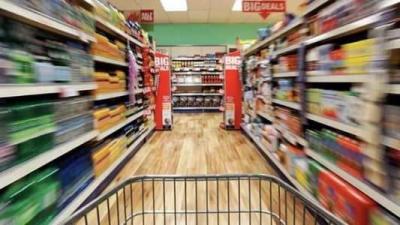After months of waiting and postponement, the decision to raise the customs dollar in Lebanon from 1,500 LBP to 15,000 LBP came into effect yesterday, Thursday. In an attempt to mitigate the impact of such a decision on people's purchasing power, which has become nearly nonexistent for many as the exchange rate in the parallel market has surpassed 40,000 LBP, relevant ministries activated their oversight roles to address a new wave of price increases affecting all consumer goods, whether subject to the customs dollar or exempt from it.
Many traders and importers decided to stockpile large quantities of goods in previous months after purchasing them at the rate of 1,500 LBP per dollar to sell them to consumers for 15,000 LBP with the implementation of the Ministry of Finance's decision at the beginning of December, thus aiming for substantial profits. Some even raised their prices weeks ago without waiting for the decision to take effect.
The Consumer Protection Directorate, part of the Ministry of Economy, has mobilized to manage the situation. The director general of the ministry, Mohamed Abu Haidar, stated that "the Directorate, accompanied by elements from the State Security apparatus, is inspecting the warehouses of food importers and requesting them to sign a commitment to sell the goods in their stocks at the exchange rate of 1,500 LBP." He pointed out, in a statement to Asharq Al-Awsat, that "initially, there was resistance from some who refused to sign, so we threatened to take legal action, which led them to comply and sign."
Abu Haidar confirmed that "the inspections of supermarkets will continue, and if we notice a rise in prices of certain goods, we will scrutinize the invoices. If it turns out that the increase is the responsibility of the importer, they will be referred directly to the judiciary because they signed a prior commitment, and if the supermarket is responsible, we will contact the judiciary to take appropriate action."
He clarified that citizens should not notice an increase in prices in the foreseeable future, considering that the quantities of goods imported this year far exceed those imported previously, with their value exceeding $10.7 billion in the first seven months; thus, there are many goods stored before the customs dollar increase, which we will ensure are sold at the exchange rate of 1,500 LBP.
The head of the Supermarkets Owners Syndicate, Nabil Fahd, does not find it logical to force traders to sell goods that were previously imported at the old customs dollar rate at their old prices. He explained that there is something called the replacement cost, meaning that the importer and trader must secure funds that allow them to import and purchase new goods at the new customs dollar rate. Here, the director general of the Ministry of Economy speaks of a significant dispute with traders over this issue, indicating that "what they argue is merely a pretext since we are talking about a tax and not the entire price of the item; therefore, it is illogical to charge consumers the tax they paid to the state at the rate of 1,500 LBP, at the exchange rate of 15,000 LBP."
Fahd pointed out that they have not raised prices while waiting to receive new price lists in LBP from suppliers. He clarified in a statement to Asharq Al-Awsat that "most food and consumer goods are exempt from customs, or come from countries with which there are trade agreements." He reassured that "people will not, as some promote, be faced with a significant wave of price increases because the goods subject to the customs dollar in the consumer basket are limited, knowing that the continuous rise in the exchange rate is what affects the prices of all goods."
Dr. Lial Mansour, a researcher in economic and financial affairs and a university professor, does not expect Lebanon to face significant chaos regarding prices "despite the greed of many traders," and she does not believe that prices will rise significantly compared to the increase that resulted from the surge in exchange rates.




